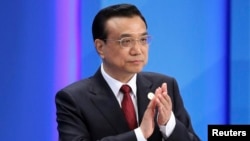BEIJING —
Chinese Premier Li Keqiang is to visit four African countries, including oil-rich Angola and Nigeria, but will not be going simply for energy deals as China increasingly aims to boost African living standards, officials said on Wednesday.
Trips by Chinese leaders to Africa are often marked by big natural resource deals, triggering criticism from some that China is only interested in the continent's mineral and energy wealth.
Africans broadly see China as a healthy counterbalance to Western influence but, as ties mature, there are growing calls from policymakers and economists for more balanced trade relations.
China is also keen not to be perceived as an imperial master.
Li's May 4-11 trip will also take in Ethiopia and Kenya and Assistant Minister of Commerce Zhang Xiangchen told reporters there would be more than just oil agreements.
“During Premier Li Keqiang's visit to the four African countries, all the relevant countries will sign some cooperation agreements between financial organizations and between companies, which are quite large in scope, not just on oil and natural resources,” Zhang said.
“There are also many on agriculture, manufacturing, people's livelihood and basic infrastructure,” he added, declining to provide details or financial figures.
Angola is China's second-largest source of crude oil after Saudi Arabia.
Li's delegation will sign agreements in the four countries which “will provide a solid foundation for future China-Africa trade and economic development”, Zhang said. He declined to say which company executives would accompany Li.
'Friendly, cooperative'
It will be Li's first visit to Africa since he became premier last year, and follows on from a trip to the continent by President Xi Jinping in March 2013, when he renewed an offer of $20 billion in loans to Africa between 2013 and 2015.
Neither Zhang, nor Vice Foreign Minister Zhang Ming who was at the same news conference, would say if any new loans were in the offing.
“Aid to Africa is just one part of China and Africa's friendly cooperative relationship. It includes politics, trade and the economy, culture, society, peace and security,” Zhang Ming said, areas Li would discuss on his trip.
China has a relationship with Africa which pre-dates its current resource-hungry economic boom. In previous decades, China's Communist leaders supported national liberation movements and newly independent states across the continent.
Li's visit comes virtually on the 50th anniversary of then-Premier Zhou Enlai's landmark trip to 10 African nations from December 1963 to January 1964.
Yet gratitude for China's aid is increasingly tinged with resentment about the way Chinese companies operate in Africa. Industrial complexes staffed exclusively by Chinese workers have occasionally provoked riots by Africans looking for work.
Zhang Xiangchen said China's aid for Africa was given in a “brotherly” way between friends and the way China tried to help would be changing.
“Our aid in the future will go even more to agriculture, health and sanitation, environmental protection, education and culture, our development cooperation will incline towards people's livelihoods, to help African countries improve livelihoods,” he said.
“Li Keqiang's visit will focus on these areas.”
Trips by Chinese leaders to Africa are often marked by big natural resource deals, triggering criticism from some that China is only interested in the continent's mineral and energy wealth.
Africans broadly see China as a healthy counterbalance to Western influence but, as ties mature, there are growing calls from policymakers and economists for more balanced trade relations.
China is also keen not to be perceived as an imperial master.
Li's May 4-11 trip will also take in Ethiopia and Kenya and Assistant Minister of Commerce Zhang Xiangchen told reporters there would be more than just oil agreements.
“During Premier Li Keqiang's visit to the four African countries, all the relevant countries will sign some cooperation agreements between financial organizations and between companies, which are quite large in scope, not just on oil and natural resources,” Zhang said.
“There are also many on agriculture, manufacturing, people's livelihood and basic infrastructure,” he added, declining to provide details or financial figures.
Angola is China's second-largest source of crude oil after Saudi Arabia.
Li's delegation will sign agreements in the four countries which “will provide a solid foundation for future China-Africa trade and economic development”, Zhang said. He declined to say which company executives would accompany Li.
'Friendly, cooperative'
It will be Li's first visit to Africa since he became premier last year, and follows on from a trip to the continent by President Xi Jinping in March 2013, when he renewed an offer of $20 billion in loans to Africa between 2013 and 2015.
Neither Zhang, nor Vice Foreign Minister Zhang Ming who was at the same news conference, would say if any new loans were in the offing.
“Aid to Africa is just one part of China and Africa's friendly cooperative relationship. It includes politics, trade and the economy, culture, society, peace and security,” Zhang Ming said, areas Li would discuss on his trip.
China has a relationship with Africa which pre-dates its current resource-hungry economic boom. In previous decades, China's Communist leaders supported national liberation movements and newly independent states across the continent.
Li's visit comes virtually on the 50th anniversary of then-Premier Zhou Enlai's landmark trip to 10 African nations from December 1963 to January 1964.
Yet gratitude for China's aid is increasingly tinged with resentment about the way Chinese companies operate in Africa. Industrial complexes staffed exclusively by Chinese workers have occasionally provoked riots by Africans looking for work.
Zhang Xiangchen said China's aid for Africa was given in a “brotherly” way between friends and the way China tried to help would be changing.
“Our aid in the future will go even more to agriculture, health and sanitation, environmental protection, education and culture, our development cooperation will incline towards people's livelihoods, to help African countries improve livelihoods,” he said.
“Li Keqiang's visit will focus on these areas.”





